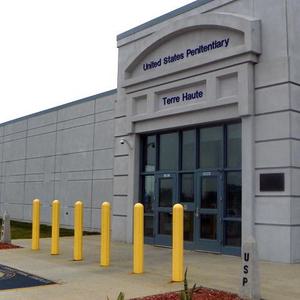
Documents obtained by the American Civil Liberties Union under the Freedom of Information Act show that the federal government’s choice to bring hundreds of people to the federal prison complex in Terre Haute, Indiana to carry out five executions in July and August in the midst of the coronavirus pandemic likely caused a COVID-19 outbreak that has already killed three and hospitalized others.
In a statement issued September 21, 2020, the ACLU blasted federal officials for repeatedly carrying out “super-spreader executions” with no regard for the foreseeable public health dangers those events created. “The government’s rush to kill has caused senseless risk for incarcerated people, prison staff, and everyone who lives in Terre Haute, Indiana,” ACLU Capital Punishment Project director Cassandra Stubbs (pictured) said.
The Federal Bureau of Prisons (BOP) website reports that two people have died from COVID-19 at the Terre Haute prison in the last week. “Those deaths were part of a larger outbreak in the wake of the federal government’s decision to carry out an unprecedented number of executions there these past few months during a deadly pandemic,” Stubbs said.
The documents obtained in response to the ACLU’s August 6 FOIA request for information on the costs and coronavirus impact of the federal executions also show that the Department of Justice failed to take basic precautions against the spread of the virus, the ACLU said. Just days before the three federal executions in July 2020, an ACLU lawsuit uncovered information that a federal Bureau of Prisons (BOP) staff member who was involved in execution preparations had tested positive for COVID-19. Contrary to prior statements made by the BOP, the ACLU said, that prison employee had worked at the Terre Haute facility without a mask. Nonetheless, the ACLU said, the documents show that BOP failed to undertake contact tracing that was sufficient “to identify staff and prisoners at risk from this reckless exposure.”
The disclosed documents also revealed that the BOP failed to conduct adequate testing to determine if people known to have been in contact with the infected prison employee had also become infected. Rather, the documents showed that the BOP permitted several staff members who were exposed to the infected staff member to decline testing. In addition, the ACLU said, “[t]he documents show that BOP has adopted a risky ‘new policy’ that allows infected staff to return to work after just 10 days of no symptoms, without being retested for the virus.”
Stubbs said “[t]he newly disclosed data from the Bureau of Prisons shows the total inadequacy of its efforts to uncover COVID-19 infections among staff and prisoners.” As a result, she said, “the true number of infections is likely much higher than the alarming number of cases reported on its website.”
The only states to have conducted executions during the pandemic — Missouri and Texas — both also experienced COVID-19 outbreaks in the weeks following those executions.
Sources
News Release, FOIA DATA REVEAL INADEQUATE TESTING AND PRECAUTIONS, FOLLOWED BY COVID-19 OUTBREAK AND DEATHS, ACLU, September 21, 2020; Nathalie Baptiste, The Trump Admin’s Execution Spree May Have Caused a Coronavirus Outbreak, Mother Jones, September 22, 2020; Courtney Bublé, Coronavirus Roundup: More HHS Shakeups; Vaccine Advisers May Have ‘Unresolved’ Conflicts of Interest, Government Executive, September 22, 2020.
Federal Death Penalty
Jan 16, 2024

U.S. Department of Justice Authorizes First Federal Death Penalty Case for Payton Gendron, Teen Who Killed Ten Black People in 2022
Executions Overview
Nov 13, 2023

Alabama Schedules A Second Execution for Kenneth Smith, Using Nitrogen Gas for the First Time in U.S. History
Federal Death Penalty
Oct 06, 2023


